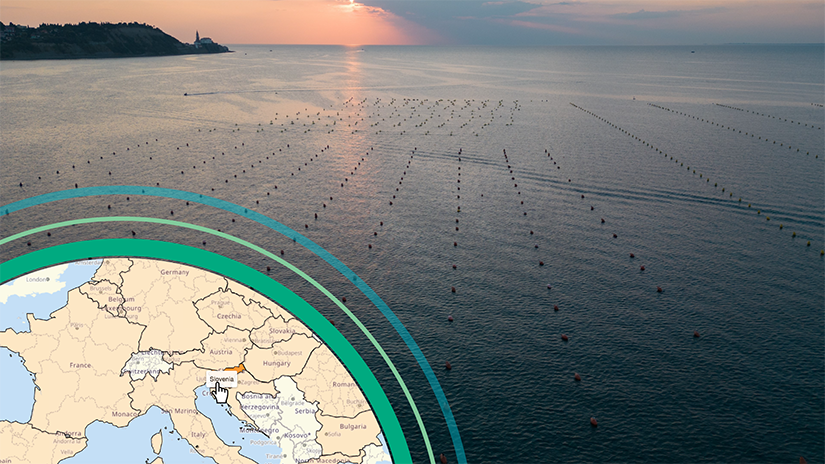Background information

Type of species farmed
Rainbow trout (Oncorhynchus mykiss), brown trout (Salmo trutta), common carp (Cyprinus carpio), freshwater catfish (Clarias gariepinus), European seabass (Dicentrarchus labrax), gilthead seabream (Sparus aurata) and Mediterranean mussel (Mytilus galloprovincialis), warty venus (Venus verrucosa).
Source: 2025, EUMOFA; Slovenia, personal com., January 17, 2023
Type of production method
64% of Slovenian production occurs in freshwater and 36% in marine waters. According to Eurostat, the following main production methods were used in 2022:
- 55% of production in tanks and raceways.
- 36% of production on bottom in sea and brackish water.
- 9% of production in ponds in freshwater.
Source: 2025, EUMOFA
Sector’s size (production and consumption)
Source: 2024, EUMOFA;
Trends (past and future)
Increasing the competitiveness and sustainability of aquaculture, as well as improving the energy efficiency of such facilities.
Source: MNSPA
Impact of aquaculture in the country’s economy, food market and labour market
The annual consumption of fish per capita as self-sufficiency in Slovenia is well below the European Union average.
Source: MNSPA
Challenges and opportunities
- Low capital strength of the sector.
- Innovation and research in aquaculture.
- Climate change and biodiversity considerations.
- Environmental performance of aquaculture.
- Low productivity.
- Optimising and shortening administrative procedures.
- Harmonised spatial planning by including space for aquaculture activities, in particular shellfish farming, re-verifying the compatibility of aquaculture with other activities and assessing the environmental impact.
- Information and traceability of aquaculture products.
- Raising consumer awareness of the benefits of home-grown food.
- Ensure further development and promote greater competitiveness of the aquaculture sector.
- The introduction of environmentally friendly forms of aquaculture will also achieve a social consensus based on the environmental acceptability of this economic activity.
- Ensuring quality, healthy and fresh products, mainly from domestic production, by ensuring traceability and control from the place of rearing to the plate.
- Digitalisation will make an important contribution to shortening the authorisation procedures for aquaculture.
Source: MNSPA
Employment and number of enterprises
Number of persons employed in aquaculture in 2020 was 181, out of which full time employed 90 persons.
Source: Statistical Office, MNSPA
Multi-annual National Strategic Plans for the development of sustainable Aquaculture
Relevant Authorities
Applicable Legislation
Applicable Procedures
- Water right (including water permits for the cultivation of aquatic organisms)
- Environmental impact assessment or environmental report
- Special permit of cultivation of alien species of aquatic organisms
- Register of aquaculture facilities and commercial ponds and records of approved aquaculture production establishments (Central Register of Aquaculture Facilities and Commercial Ponds) (CRA)
National associations and networks
- Chamber of Agriculture and Forestry of Slovenia
- Aquatic Animal Farmers Association of Slovenia
Relevant Websites
Contact Details
Ministry for Agriculture, Forestry and Food, Fisheries sector
Borut Kosi, Adviser
- Telephone number: +386 1 478 9370
